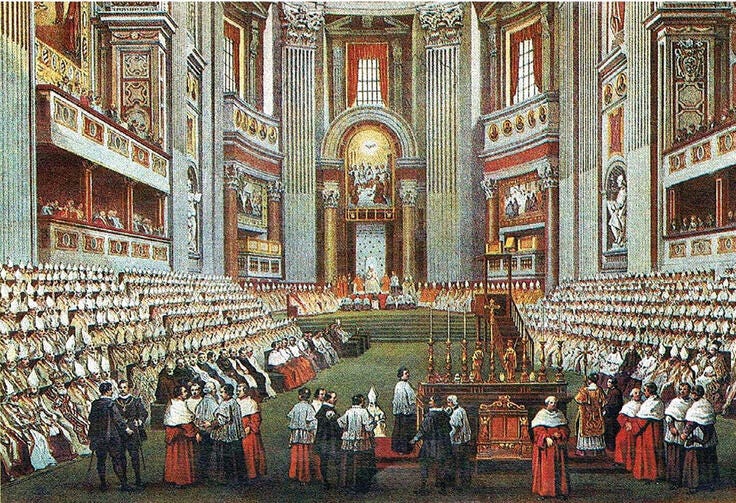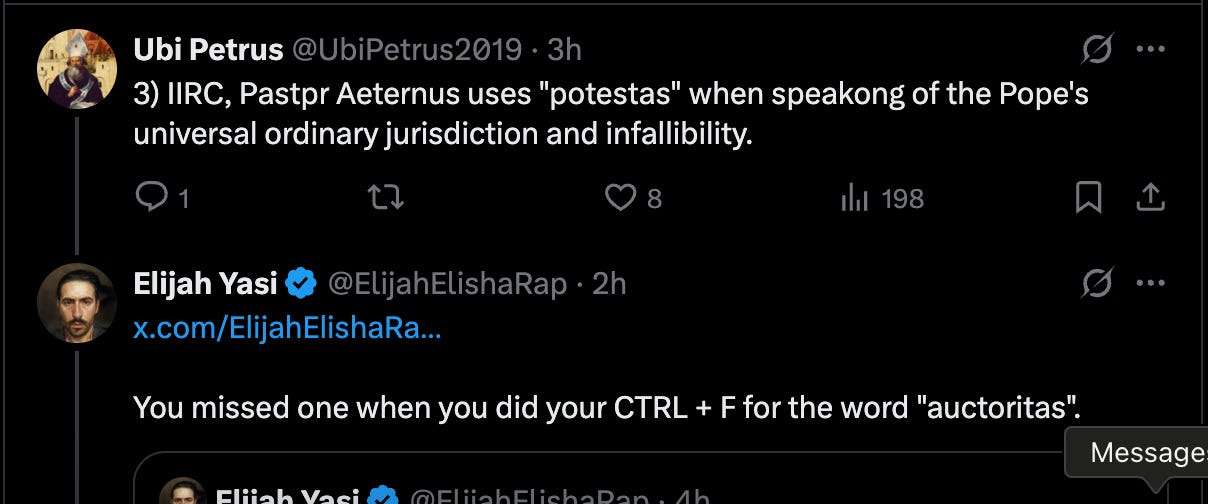Above: a depiction of the First Vatican Council (Concilium Vaticanum Primum), which took place from 1869 to 1870 under Pope Pius IX.
In response to my last essay (Auctoritas et Potestas Iterum: Ubi Petrus Tweets Back) Denny Sellen accuses me of dishonesty. Let’s recap, and then consider who is actually being dishonest.
For full disclosure, I saved a PDF of Denny’s original 2019 blog post earlier this week, so any attempt to alter or remove his prior statements will be easily exposed. It is a poor look indeed to accuse someone of dishonesty for quoting your own words.
In response to my previous essay, he writes:
It's conspicuous that he has not been honest in recounting what I said auctoritas was—even in our debate on PWA, I specified it included ‘ratification’ and ‘witness.’ That he has to strawman to win is a poor look.
He also bizarrely repeated on Twitter/X the same thing he falsely asserted in his blog post (to which I linked in my previous essay):
While reading Mr. Ybarra’s quotations, recall that in Vatican I’s Pastor Aeternus, which defined universal immediate and ordinary jurisdiction as well as papal infallibility, though the term auctoritas appears numerous times in the document, it is never used within the document to define jurisdiction or infallibility. [emphasis mine]
Let us take these issues one by one.
First, I have not misrepresented Denny’s views. I have cited and quoted his claims accurately. In his debate with Erick, he reiterates what I quoted in my previous essay:
You also confuse auctoritas and potestas. Auctoritas was a certain clout you might have. It also meant ratification. For example, the senate would ratify a consul who would then use potestas with actual juridical authority.
Why would it be important to say Erick confused auctoritas and potestas? Because Pope Leo used the former term, and Denny wants to undermine the binding authority of Leo’s Tome—or any other papal exercise of auctoritas. He repeatedly contrasts auctoritas with binding juridical authority, denying that it entails a right to command or a power to bind. While he occasionally says it includes “ratification” or “witness,” these are framed as non-binding endorsements, not sources of juridical standing. So even when he mentions those terms, he merely reinforces his underlying claim: that auctoritas lacks binding force. Thus, he argues that insofar as papal authority was auctoritas and not potestas, it could not have been binding—the exact assertion I addressed.
In both his debate comments and his rejoinder to Erick Ybarra (linked in my last essay), he consistently portrays auctoritas as non-binding: “soft power,” “clout,” or merely “ratification” without juridical effect. For example:
Auctoritas, in Roman and post-Roman understanding, is not the ‘power’ to bind or compel. It is the influence or esteem one holds, voluntarily acknowledged, such that it might move others to act.
This word is often misunderstood today. It is not a juridical term. It is, instead, closer to what we might call ‘soft power.’
In Roman practice, auctoritas does not mean ‘power’ (i.e., potestas). It refers to esteem, clout, or prestige. It can also mean ratification or approval (e.g., senatus auctoritas).
I simply showed that these claims reduce auctoritas to vague social prestige, and that such reductionism contradicts not only his cited sources (e.g., Pollmann, Lewis & Short) and Roman political practice, but also the views of historians like Grant, Muldoon, Ullmann, and Benson. Quoting and refuting someone’s words is not misrepresentation.
More importantly, Denny’s own definition creates a fatal dilemma. If auctoritas includes “ratification” or “witness” in a binding sense—even if not coercive—then he has conceded the very principle he set out to deny: that the Pope’s auctoritas can bind. Quod erat demonstrandum. In that case, his objection to Catholic claims from the term alone collapses. But if, on the other hand, he denies that auctoritas can bind at all—reducing it to mere “soft power” or esteem—then he’s wrong, as I’ve showed. Either way, his argument fails. He is trading on a confusion, whether intentionally or not, by conflating the absence of potestas (coercive power) with the absence of rightful authority to bind.
Second, his claim about Vatican I is patently false. Pastor Aeternus uses the term auctoritas multiple times, including with direct reference to infallibility:
…when, in the exercise of his office as shepherd and teacher of all Christians, in virtue of his supreme apostolic authority, he defines a doctrine concerning faith or morals to be held by the whole Church, he possesses… that infallibility…
So, according to Vatican I, by what authority does the Pope enjoy infallibility? By his supreme apostolic authority. And what is that in Latin? Auctoritas apostolica suprema.1
Being made aware of his error, he retreats to a hopeless cope:
The problem is obvious: he has shifted from a historically false statement (“auctoritas is never used within the document to define jurisdiction or infallibility”) to one that is conceptually confused: “I only meant that V1 didn’t define infallibility as auctoritas”. Of course it didn’t—because that would be absurd. It is a basic category mistake. Infallibility is the divine protection from error when certain conditions are met. Auctoritas is the juridical standing or right by which the Pope lawfully teaches those things. Infallibility is a property; auctoritas is the condition for that property. The former describes what happens, the latter describes who may do it, and by what right. The Council says the Pope defines doctrine for the whole Church by virtue of his supreme apostolic authority (pro suprema sua apostolica auctoritate)—which is exactly what he denied until the text proved otherwise.
At this point Denny should follow what he rudely and wrongly told Erick during the debate: stop circling.
Finally, consider the correction from Fr. John Ramsey, an Eastern Orthodox priest and scholar. He recently criticized Denny and other Orthodox apologists for misunderstanding the papal claims. The contention between Catholics and Eastern Orthodox—where the conflict really lies—is not whether the Pope has real, binding authority, but rather the structure in which that authority is exercised.
The auctoritas objection is a red herring—an attempt to undermine Vatican I by appealing to an a priori definition that is not only historically mistaken but theologically irrelevant.
Now, Denny is not a fan of Fr. Ramsey. I can understand why. Fr. Ramsey is honest and knowledgeable of the relevant issues.
In sum, I have not misrepresented Denny. I have quoted him, fact-checked him, and answered him. His charge of dishonesty is false. His claim about Vatican I is false. And his assumptions are rejected even by thoughtful Orthodox voices like Fr. Ramsey. Denny might wish I were dishonest—it would make me easier to dismiss. But unfortunately for him, I’m not. I leave to the reader the task of judging Denny’s own credibility.
Due to constraints of work and family, I will let the matter rest here for now.
May God bless you all.
Latin: Itaque Nos traditioni a fidei Christianae exordio perceptae fideliter inhaerendo, ad Dei Salvatoris nostri gloriam, religionis Catholicae exaltationem et Christianorum populorum salutem, sacro approbante Concilio, docemus et divinitus revelatum dogma esse definimus: Romanum Pontificem, cum ex Cathedra loquitur, id est, cum omnium Christianorum Pastoris et Doctoris munere fungens, pro suprema sua Apostolica auctoritate doctrinam de fide vel moribus ab universa Ecclesia tenendam definit, per assistentiam divinam, ipsi in beato Petro promissam, ea infallibilitate pollere, qua divinus Redemptor Ecclesiam suam in definienda doctrina de fide vel moribus instructam esse voluit; ideoque eiusmodi Romani Pontificis definitiones ex sese, non autem ex consensu Ecclesiae irreformabiles esse.








